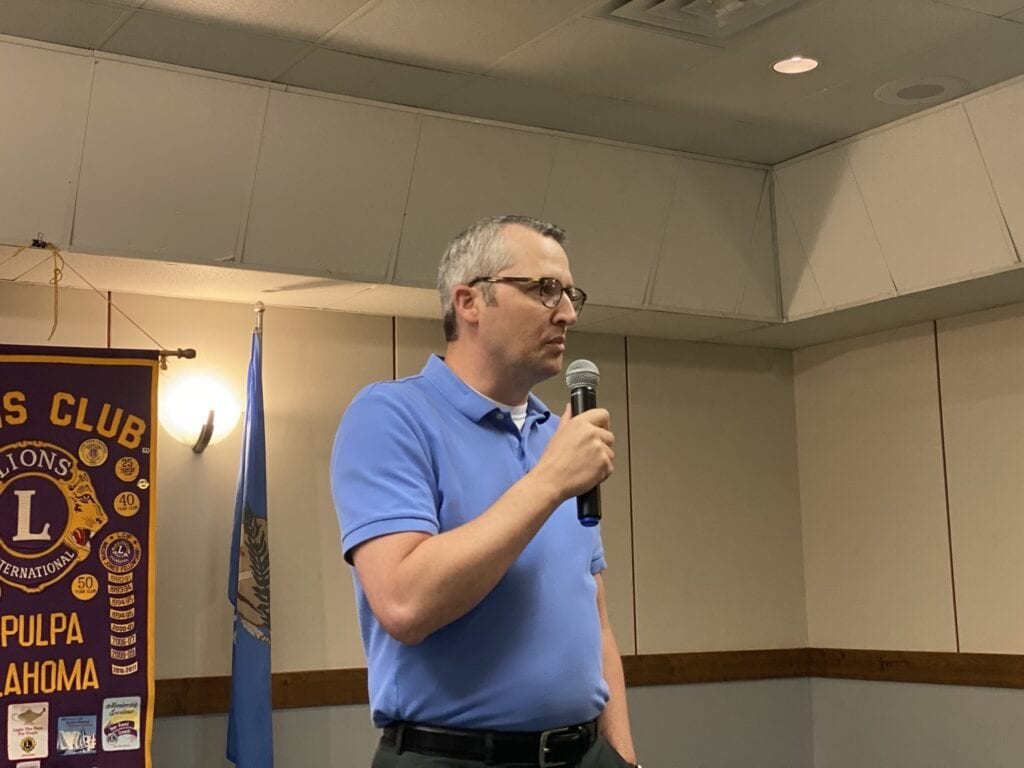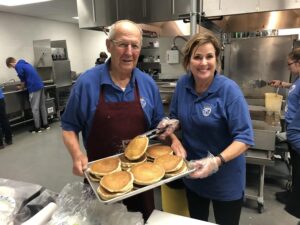State Representative and Sapulpa Economic Development Director Mark Lawson joined State Representative Kyle Hilbert and Senator James Leewright at Wednesday’s Joint Civic Luncheon—the first since before COVID turned the world upside down in 2020. Lawson led the legislators in acknowledging as much, but the biggest change in his life during the interim was welcoming Ivy Ruth Lawson into the family that April.
“2020 of course was a blur for many of us, but having a baby has just been amazing for me,” he said. “So my experience for 2020 was probably much different than you, but there’s been a lot going on.”
Lawson filed eight bills for the House this year and also agreed to author three senate bills. He went 10 for 11, getting his first veto from the governor. He said Governor Stitt committed to him that they would work together to look at restructuring what he calls “the entire human services space.”
“When it comes to children and families, there’s the Department of Human Services,” he began, “There’s the Office of Juvenile Affairs…and then we have the Oklahoma Commission on Children and Youth. And the reality is, is all three of those agencies deal with the same populations,” he said. Lawson says the goal is to streamline some of those services so that the state can “better coordinate our efforts to make sure that we’re providing the oversight and services to families and kids across the state.”

Lawson brought up House Bill 3211, which made it so that children under the age of 18 who are charged with a crime—even one as serious as first-degree murder—are going to be in juvenile detention instead of adult jail. He says the state has had instances where juveniles have been arrested and charged, and then ultimately hanged themselves or hurt themselves in adult jail. Aside from that, having juveniles in adult jail actually places more of a burden on the adult jail. “You’ve got deputies or correctional staff in our jails across the state, who are trained to deal with adults, not necessarily juveniles and to, to take one of those staff to keep eyes and ears on a juvenile takes them away from other duties that they have,” Lawson said.
The other bill Lawson said he was most proud of is House Bill 2352, which began as a bill to remove duplicative paperwork regarding adoptions, but transformed into a child abuse and neglect bill. “You guys are familiar with McGirt, we are seeing a lot of Fallout and a lot of other areas where the McGuirk ruling is causing some concern.”
An attorney out of Carter County filed a suit claiming that the state didn’t have jurisdiction over the tribe’s children, even when they had been abused or neglected. For decades, the Indian Child Welfare Act has given the state the legal ability to remove children from unsafe or unfit homes, regardless of their tribal affiliation. This suit would put 2500 children at risk of being returned to unsafe conditions in the state of Oklahoma. “So what House Bill 2352 did was reaffirm these agreements that we have with our with the Indian nations across the state to say that when it comes to abused and neglected kids, we are going to work together,” Lawson said, adding that there are other facets to the McGirt ruling they’re still trying to figure out, but he was very pleased that the state said “we’re going to take care and do what’s right by our kids,” he said.
As to the future, Lawson says he’s looking forward to the work coming up in the next few years as he turns his attention to an often-overlooked category in our state: the developmentally disabled. “These are individuals who have a developmental disability, who would otherwise qualify for services. And these are lifelong services that they’ll need. But we have a waiting period of about 13 years in the state of Oklahoma.” Comparatively, Lawson says, nearby Kansas has a four-year wait. Hopefully, that will begin to change in the near future. “We have a comprehensive plan in place,” Lawson says, which includes a third-party entity doing a state-wide assessment of 5800 individuals in Oklahoma who have these disabilities to get a better understanding of what they need and how to provide them, particularly at the home, as Oklahoma makes strides to get away from institutionalized care. “I feel like in the next couple of years, we have every reason to believe that we can eliminate that list completely, Lawson says. And I think that that’s a big deal.”
Sapulpa Times will cover the remarks from Leewright and Hilbert in future stories. Stay tuned.










